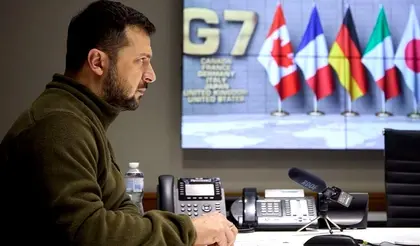President Volodymyr Zelensky has encouraged nations to impose additional sanctions against Russia in response to “a new wave of terror” following attacks in Ukraine on Oct 10.
As Russian missiles struck various parts of the nation, at least 19 people were killed and numerous others were injured.
JOIN US ON TELEGRAM
Follow our coverage of the war on the @Kyivpost_official.
He was defiant, saying the attacks would only “delay our recovery a little.”
Oct. 11 saw more strikes, and Zelensky urged the West to come up with fresh tactics for putting political pressure on Russia and assisting Ukraine.
After his emergency virtual meeting with the G7 nations on Oct.11, he received calls from the member states. The group, which comprised the U.S., Canada, France, Germany, Italy, Japan, and the U.K., pledged to support his nation “for as long as it takes” in terms of “budgetary, philanthropic, military, diplomatic, and legal” support.
“For such a new wave of terror, there must be a new wave of responsibility for Russia – new sanctions, new forms of political pressure, and new forms of support for Ukraine,” Zelensky declared.
“The terrorist state must be deprived of even the thought that any wave of terror can bring it anything.”
According to Russian President Vladimir Putin, an explosion on Oct. 8 on a crucial bridge connecting Russia and Crime prompted the attacks.
Since the Russian invasion of Ukraine in February, Western nations have widely imposed sanctions against Russian companies and Putin’s allies.

Trump Makes 90 Day Foreign Aid Freeze – Ukraine Military Support Supposedly Untouched
Over 1,000 Russian people and companies, including oligarchs, have been sanctioned as a result, in addition to the removal of significant Russian banks from the global financial messaging system Swift.
The European Union has been hesitant to ban Russian gas imports because it gets about 40 percent of its gas needs from Russia, despite the U.S. ban on all imports of Russian oil and gas.
Since the beginning of the war, Ukraine has not experienced a bombardment as intense as the one that occurred on Oct. 10. Kyiv was the target of several strikes: Prior attacks had not hit the city’s centre, and this was the first time in months that the Ukrainian capital was attacked.
During the morning rush hour, civilian areas were attacked, including well-liked Shevchenko Park and a playground for kids. Many neighborhoods experienced a power outage as a result of the destruction of infrastructure.
President Zelensky reported on Oct. 11 that 28 additional missiles had been fired, 20 of which were intercepted. He mentioned Iranian combat drones among them. The BBC was unable to confirm this.
“If it wasn’t for today’s strikes, we would have already restored the energy supply, water supply and communications that the terrorists damaged yesterday,” declared the president in his weekly address.
“Today, Russia will achieve only one additional thing: It will delay our recovery a little.”
He continued by saying that nationwide recovery efforts were moving along “quickly and efficiently” and that most cities and villages targeted by the Oct. 10 attacks had their electricity and communications back.
“Where there was destruction, the infrastructure will be renewed everywhere. Where there were losses, there is already or will be construction,” Zelensky affirmed.
You can also highlight the text and press Ctrl + Enter










